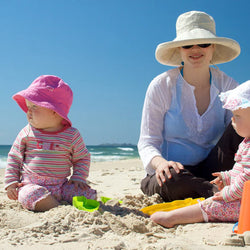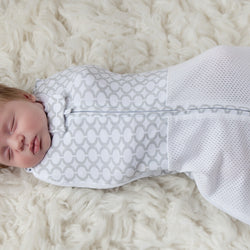The Essential Teething Guide
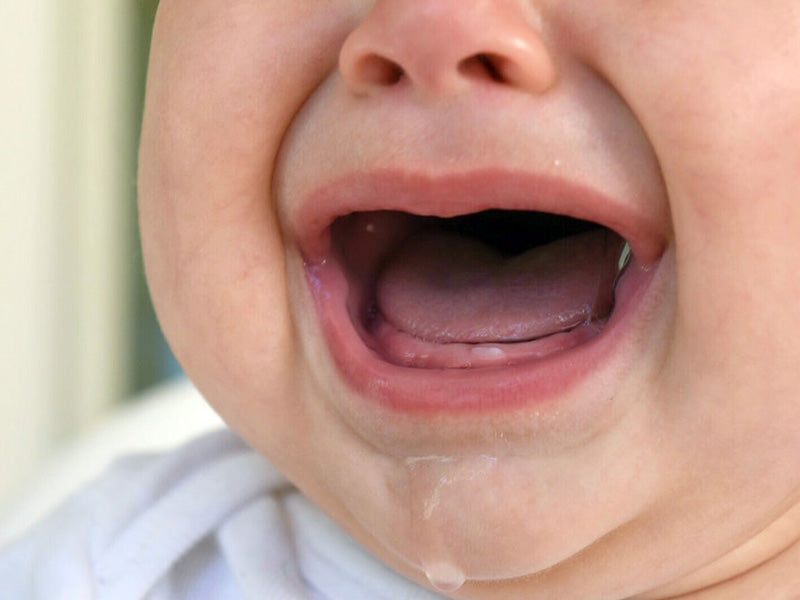
by Molly Ryan
Jul 13, 2020
If baby is between 3 months old and 12 months old you may be anxiously awaiting the exciting arrival of baby’s first tooth. When does teething start? What symptoms should you look for? How do you soothe a teething baby? We’ve consulted some of our favorite doctors and our friends at What to Expect When Expecting and compiled a helpful teething guide.
Every baby experiences teething differently. Some babies have little to no symptoms, while others find teething to be a fairly difficult process. Often teething symptoms happen weeks or months before the arrival of the actual tooth. You can expect teething symptoms as early as three months old and as late as one year old.
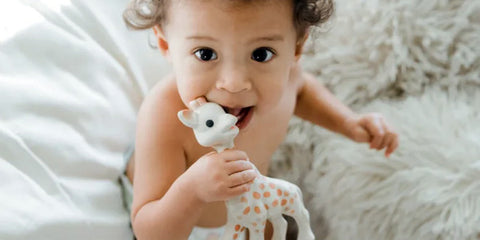
Common Teething Symptoms include drooling, biting, crying, irritability, refusing to eat, ear pulling, cheek rubbing, waking at night, rashes, and coughing/gagging.
Article Continues Below Advertisement
Drooling: It's hard to believe so much fluid can come from the mouths of tiny babes, but teething stimulates drooling, and the waterworks are on for many babies starting from about 10 weeks to 3 or 4 months of age or older. If you find that your baby's shirts are constantly soggy, fasten on a bib to keep him more comfortable (and cleaner), and gently wipe his chin throughout the day to stave off chapping.
Biting: Pressure from teeth poking through under the gums causes baby a lot of discomfort — which can be relieved by counterpressure (aka chewing and biting). Teething babies will gum whatever they can find, from teething rings and rattles to your soon-to-be sore nipples (if you're breastfeeding) and fingers.
Crying: Some babies breeze through teething with nary a whimper, while others suffer from a good deal of pain due to the inflammation of tender gum tissue — which they feel compelled to share with you in the form of whining or crying. First teeth usually hurt the most (as do the molars, because they're bigger), although most babies eventually get used to what teething feels like and aren't quite so bothered later on. Talk to your doctor about when to offer pain relievers like infant acetaminophen.
Irritability: Your baby's mouth will ache as that little tooth presses on the gums and pokes up to the surface, and, not surprisingly, it'll probably make him feel out of sorts. Some babies may be irritable for just a few hours, but others can stay fussy for days or even weeks.
Article Continues Below Advertisement
Refusing to eat: Uncomfortable, cranky babies yearn to be soothed by something in their mouths — whether a bottle or the breast. But the suction of nursing may make a teething infant's sore gums feel worse. For that reason, teething babies can be fussy about feedings (and get more frustrated as neither their discomfort nor their hungry tummies find relief). Those eating solid foods may also refuse to eat while they're teething. Keep at it, and call your pediatrician if the strike lasts more than a few days.
Waking at night: The teething fairy doesn't only work days. As your baby's little chompers start to emerge, his discomfort may disrupt his nighttime slumber (even if he previously slept through the night). Before offering comfort, see if he can settle himself back to sleep; if he's still restless, soothe him with patting or lullabies but avoid a return to overnight feedings (which will come back to haunt you when this phase has passed).
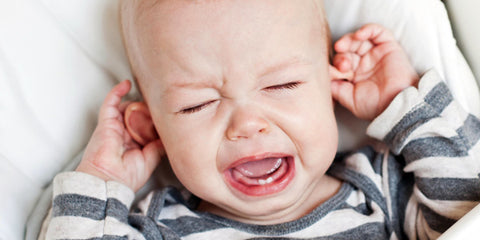
Ear pulling and cheek rubbing: Babies whose teeth are coming in may tug furiously at their ears or rub their cheeks or chins. The reason? Gums, ears and cheeks share nerve pathways, and so an ache in the gums (especially from erupting molars) can travel elsewhere. (Babies with ear infections will also yank on their ears, so check with your pediatrician if you suspect your little one may be bothered by more than just teething.)
Article Continues Below Advertisement
Teething rash: If your teething baby is drooling, the constant drip may cause chafing, chapping, redness and rashes around his mouth and chin (and even on his neck). Patting it away will help prevent his skin from taking a hit. You can also create a moisture barrier with Vaseline or Aquaphor, and moisturize with a gentle, unscented skin cream as needed. Have some nursing cream (like Lansinoh) on hand? That's great for protecting tender baby skin, too.
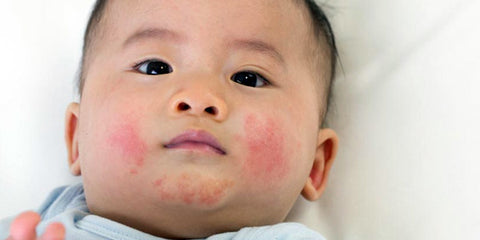
Coughing and/or gag reflex: All that drool can make babies gag and cough (you'd choke too with a mouthful of spit). But it's not cause for concern if your baby has no other signs of cold, flu or allergies.
Teething Remedies:
Article Continues Below Advertisement
You can help alleviate your baby's teething discomfort with the mom-tested suggestions we listed below:
- Teething babies love to chew, and for good reason: The gumming action provides counter-pressure, which relieves the aching of new pearly whites pushing up and out into the mouth. Bumpy rubber teething rings, rattles and other chewy, soft toys work well (including, as your baby has probably figured out, the plastic bumper on a crib rail).
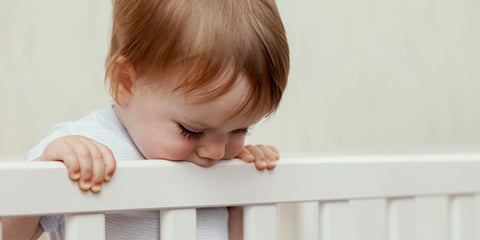
- Counter-pressure. Your clean finger, teething toys with nubbly edges or a soft, wet toothbrush (without toothpaste) rubbed firmly on baby's gums can provide the same soothing counter-pressure as teething rings and wet cloths. Your baby may balk at first because it might hurt initially, but it soon brings relief.
-
Cool Items in the mouth. Often, something cold in your baby’s mouth helps. Chewing is even more effective when a toy is cold and numbs the gums. Try a cold pacifier spoon, clean wet washcloth, or a refrigerated teething toy or ring. Some experts say frozen teething toys are too cold and may hurt your baby’s mouth. Keeping a supply of teething toys or wet washcloths in the fridge will help you be prepared for baby’s pain. Make sure to clean teething toys, washcloths, and other items after the baby uses them.
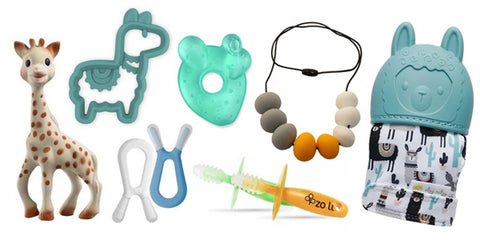
- Cold drinks. A bottle of cold water can offer chilly relief to achy gums for babies over 6 months (when water can be introduced). If baby doesn't take a bottle, you can give (ice-free) water in a cup.
- Cold food. Refrigerated food such as yogurt, blended peaches and applesauce (once they've already been introduced to your baby) can be more appetizing than warm or room-temperature treats and can ease achy gums. Or give frozen fruits like bananas and plums in a baby feeder mesh bag (so large chunks of food can't pose a choking risk), but only under adult supervision and with baby sitting or propped upright.
- Pain relief. If chewing, rubbing and sucking chilly foods don't do the trick, break out the baby acetaminophen — but only after checking with your pediatrician.
- Comfort. Extra snuggles, kisses and lots of patience are what a teething baby craves.
- Avoid numbing agents. The US FDA warns against using topical numbing agents, which can put children under age 2 at risk for reduced oxygen levels in the blood. The FDA also says parents should avoid any herbal or homeopathic teething gels and other meds, especially since some contain an ingredient that can cause heart problems and drowsiness. Consult with a pediatrician, or medical professional before using products on baby’s teeth.
**Pro tip: If you are nursing your baby, try dipping your fingers in cool water and massaging his/her gums before each feeding. That may keep him/her from biting your nipple while nursing.
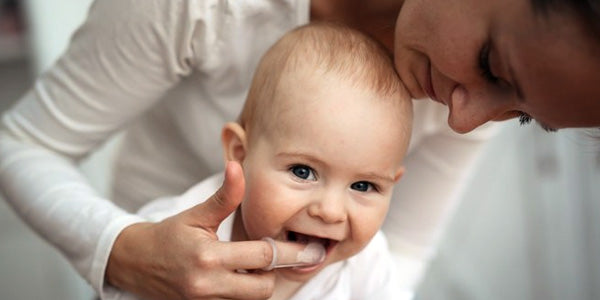
When to call the doctor about teething:
Teething can cause bleeding under the gums, which may look like a bluish lump in baby's mouth. It's nothing to be concerned about and can be relieved with a cool, wet washcloth.
While some parents swear that low-grade fever and diarrhea are teething symptoms, doctors are divided on whether that's true. But like inflammation anywhere else in the body, inflamed gums can sometimes produce a low-grade fever.
So if your little one does develop a temperature of under 101 degrees while he's cutting a tooth, it could be caused by swelling of the gums and isn't anything to worry about. If the fever continues for more than three days, if it's higher than 101 degrees or if it's accompanied by any other symptoms of illness, call your pediatrician.
The same goes for diarrhea, which some parents speculate can be caused by all the extra drool that gets swallowed when a baby is teething. It's not cause for concern, either, but if it lasts for more than two bowel movements, give your child's doctor a call.
Always remember that what works for a friend’s baby may not work for you and your baby. You will more than likely end up trying many different remedies before you find the right combination to ease your baby’s discomfort.
Molly Ryan
Molly is a mom of 5, grandma of two and a baby product expert. For the last 23 years she has enjoyed connecting parents to products and resources that help make their parenting journey uniquely theirs.




